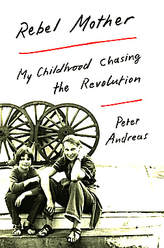A WRITER'S WIT |
My Book World

Childhood Chasing the Revolution. New
York: Simon and Schuster, 2017.
This book is one of those that drew me in and would not let me go until I had finished it. I made not a single annotation or underline because the narrative was so compelling that I didn’t wish to stop and write.
Carol Andreas is raised as a Mennonite in North Newton, Kansas, and in the 1950s she marries another Mennonite seven years her elder. From this marriage she gives birth to three sons, one of whom is author, Peter Andreas, the youngest. As the Andreas family lives in suburban Detroit, Michigan, Carol eventually earns a PhD and radicalizes her political thinking. Against her husband’s wishes (he refuses to grant her a divorce), she packs up all three sons and moves to Berkeley, California, the epicenter of 1960s and 1970s radical politics.
As part of her radicalization, Carol Andreas abdicates her traditional role as mother and allows her three sons to make many of their own decisions, for example, whether they want to attend school on a particular day. However, when she decides to move to South America to aid the revolution there, she takes eight-year-old Peter with her—partly to spite her husband, partly because the child is too young to care for himself, but mostly so that she can mold his socio-political views. The other two sons prefer to remain in California and reside in the commune where they’ve all been living.
The heart of the book is about the years that Carol and Peter spend in three different South American countries. Instead thriving in the warmth of a middle-class Michigan home, Peter lives a rather deprived life. He is subject to the harshest living conditions as his mother does what is necessary to aid others in their political goals. He witnesses her many different boyfriends, sometimes having to sleep in the same room with them as they make love.
In one situation, his hair is infested with head lice. Worse yet, his mother places him in adult situations, “assignments” he accepts because they make him feel grown up. He even participates in his own kidnappings from Michigan schools, after his father has been awarded custody so that he can live with his mother in South America. His allegiances to each parent are probably stretched even tighter than most children of divorce, because his parents represent two different extremes and because both are set on having their way.
However, the narrative illustrates the strength of a love that can develop between parent and child. Carol Andreas makes many mistakes, yet even so, son Peter never stops loving his mother. At one point, as he reaches college, he does realize he will never be like his mother, nor like his father. He must become his own person, and he informs each parent of his desires. If Peter has learned anything from his mother it is that he is responsible for his own life, his own happiness, and as he matures he begins to pursue the one he wants. Today, he is the author of ten books and John Hay Professor of International Studies at Brown University. His childhood must in no small way inform his adult life.
NEXT TIME: New Yorker Fiction 2017



 RSS Feed
RSS Feed